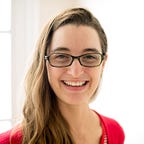Editing Wikipedia as self-care activism
My favorite podcast constantly reminds me of the importance of self-care. (Thank you, Heben and Tracy.) And lately, I’ve noticed that an important part of my self-care routine also happens to be activism. Here’s what I do:
Edit Wikipedia.
I make a lot of different types of Wikipedia edits, but I nearly always choose edits that increase the representation of the under-represented. The way we each look at the world is influenced by the way our surroundings represent it: the people we talk to, the movies we watch, and the information we read. And people with Internet access read Wikipedia.
Though editing Wikipedia doesn’t lift my spirits in the same way that watching a Vine of a dog that looks like it’s wearing a dog costume does, I find that making these edits gives me a lasting feeling of relief. I am doing something that holds my focus and that adds, in its little way, to the equality I want to see in the world.
So, here are ideas for Wikipedia edits at three levels of complexity that you can start making today. All you need to get started is a Wikipedia account.
Level 1 — Add Wikilinks
Wikilinks are what make encyclopedia articles Wikipedia articles. These are the links that you see scattered throughout the body of article. By connecting one article to another, they help readers learn about things that they don’t already understand.
As it turns out, lots of folks who create new articles don’t add Wikilinks to them. It’s a pretty straightforward thing to do, so it’s a good match for when I need a distraction but can’t get myself to focus fully.
Conveniently, people make lists of articles that need these kinds of improvements. Of particular interest might be articles in the African Diaspora and LGBT Studies WikiProjects.
Level 2 — Add info you just researched
This may sound familiar to you. I have a question about a specific topic, I Google it, and I immediately click on the Wikipedia article at the top of the results. And then I see that the article doesn’t cover the answer to my question.
But I’m determined, so I go find the answer. And I find it. Satisfaction!
Here’s the next step — I go back to that Wikipedia article and add the bit of information that I found. What I add doesn’t have to tell the whole story; I just add a one-sentence summary with the core idea, and include the source I found as a citation. I’ve already invested the time to find out the information; it takes just three more minutes to document it for someone else to find.
Level 3 — Expand a Wikipedia article
I now try to do this each national holiday, and, increasingly, when I want to do something to honor a tragedy. Recently, I sought to improve an article about an LGBT scientist, in honor of Pride and Orlando in June.
After a quick Google search (“LGBT scientists”), I was led to the amazing public health doctor Sara Josephine Baker. A quick glance at her article revealed a slew of “Citation Needed” tags. Each tag means that another editor thought a fact in the preceding sentence needed to be verified. Basically, they created a tidy to-do list for me.
And with Wikipedia’s Visual Editor, adding citations is way easier than you remember from school.
So, I open up every resource listed at the bottom of the article, and then look through them (and often use the Find feature: Cmd + F for Mac and Ctrl + F for PC) for mention of the thing stated in the sentence just before the tag. I can nearly always replace a few of the tags without digging up new resources. And by the time I’ve done that, I’m usually interested enough in the subject that I find myself making more in-depth edits.
You can do this
If you ever had to write a research paper in school, you have the knowledge you need to do these kinds of improvements.
If you want to go deeper and have a library card, you likely have access to a pile of databases that will help you find resources beyond what’s freely available on the internet, and yet still available to you via your home computer. For example, here are the DC library databases and St. Louis city library databases.
Editing Wikipedia is a way I take care of myself and help this world become a more equal place.
Try it out. It might become an integral part of your self-care activism, too.
